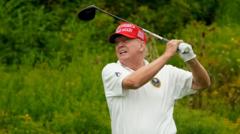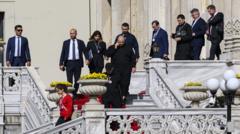As Vietnam braces for potential tariffs from the US, Prime Minister Pham Minh Chinh's willingness to engage diplomatically—expressed humorously through golf—raises questions about the effectiveness of personal relationships in navigating complex trade dynamics.
Vietnam's Diplomatic Golf: Can It Save Its Trade from Trump's New Tariffs?

Vietnam's Diplomatic Golf: Can It Save Its Trade from Trump's New Tariffs?
In light of looming tariffs from the Trump administration, Vietnam explores diplomatic channels to mitigate economic impacts.
Vietnam is bracing itself for significant economic challenges as the Trump administration prepares for what some are calling a new "Liberation Day in America!!!" The move is expected to unveil reciprocal tariffs that could greatly impact nations like Vietnam, which already grapples with a considerable trade deficit with the US. The country's ability to navigate this economic turbulence may hinge on the personal rapport crafted by Prime Minister Pham Minh Chinh and the former US president.
Chinh lightheartedly suggested at a January meeting that he would happily spend the day "golfing" with Trump if it proved to be in Vietnam's favor. This approach echoes strategies employed by other world leaders who have successfully cultivated relationships with Trump centered around a shared love for the sport. Despite this tactic's humor and charm, some analysts express skepticism about its potential effectiveness in swaying US tariff policies.
Historically, Trump has criticized Vietnam for its trade practices, labeling it a “worse offender” than China. With the nation currently enjoying a boost from companies moving out of China, any shifts in Trump's approach remain uncertain. Experts, such as former trade negotiator Stephen Olson, underline that while Chinh’s approach might mirror Shinzo Abe’s successful strategy with Trump, the latter's fixation on trade toughness could overshadow personal dynamics.
Vietnam’s government has maintained a non-restrictive stance on trade with the US, albeit with cautious adjustments to its own tariffs and regulatory environment. Initiatives such as trial agreements for SpaceX’s Starlink services signal a strategic alignment with key US interests. Similarly, Vietnam's recent tariff reductions on American imports, just weeks after lucrative trade deals were signed, showcase a calculated effort to improve trade relations.
However, analysts caution that Vietnam's close ties to China present a critical hurdle. The proportion of imports from China, alongside significant Chinese investment in Vietnam, raises eyebrows in Washington. Observers expect that the unintended consequences of alignment with China will not escape Trump’s scrutiny, possibly putting Vietnam on a collision course for tariffs.
The looming situation places American companies operating in Vietnam—such as Apple and Nike—at risk of facing disruptions if tariffs are enacted. Recent surveys reveal a sentiment of distress among US manufacturers in Vietnam who fear layoffs could follow any tariff introduction.
As the Vietnam administration positions itself for the impending economic shift, it remains committed to a foreign policy dubbed "bamboo diplomacy," one characterized by flexibility in response to global pressures. The coming weeks will test the effectiveness of this approach against the backdrop of escalating trade tensions, particularly as concerns over the trans-shipment of Chinese goods through Vietnam remain prominent.
With the imminent trade review set to unfold, it appears that golf might either pave a smoother path or highlight the chasms in Vietnam's diplomatic endeavors with the Trump administration. As negotiations unfold, all eyes will be on whether Vietnam can truly capitalize on personal relations or if it will find itself ensnared in the ongoing tariff war.





















